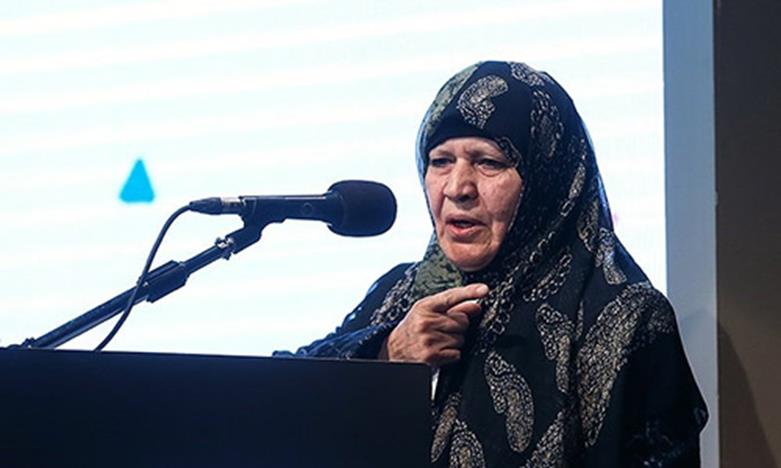Mansoureh Ghadiri Talked about Behjat Afraz
You must be both a mother and a father
Narrator: Mansoureh Ghadiri*
Adjusted by Maryam Rajabi
Translated by Ruhollah Golmoradi
2019-4-16
My wife had the longest captivity and I got the most energy from Ms. Behjat Afraz. I was at the age of 28 when my husband became missing, and when it became clear he was captured, I was very busy and I didn't have leisure time; like a soldier who wears military boot in the morning, I slept upon my book and pamphlet. I was a professor at Shahid Rajaee University and from there I went to Allameh Amini High school as a deputy and when I returned, I tutored mathematic for children of my colleagues and I was not beholden to anyone except God.
My husband was completely missing in early days of his captivity; after a while, a letter came from him; after that, for a year and a half to two years, we did not even have one line letter from him, and when, after this time, a three line letter arrived from My husband, my father read the letter, and while he was just at the age of 57, he stroke a heart attack and we buried him in the morning! In the situation I did not droop my spirit. I resorted to Imam Ali and asked God to help me.
Mrs. Afraz gave a lot of energy to family of the captives and missing people. Shift work did not matter to him at all, and whenever I came from Karaj she was still at work. My field of study was psychological counseling, and for what I was doing, I might feel a little more responsibility than others. Mrs. Afraz sometimes got some resolutions from me in these cases. I remember that I turned back from university and high school one day, and I was very tired. She called me and said you just come here fast. I became worried and asked anything happened to Morsal? She said no, she told it is about wife of one of the captive.

When I arrived, I saw that a young woman sat there and had a beautiful girlfriend photo in her hand, and brought oil to burn herself! Mrs. Afraz, who was so solvent of problems, no longer knew what she should do in front of this woman. She asked me to tell her some of my problems to calm her down. I went into the room and talked to him. I put Quran in front of him, and finally I convinced him and said, "Do you think if you kill yourself, problem of this kid would be solved?" No! You must be both a mother and a father.
________________________________________
* Mansureh Ghadiri is wife of freedman Major General Morsal Ahangari. His spouse was captured by Saddam's army for ten years. Ms. Ghadiri was selected as a sample counselor in the country and has 31 years of service in education. She also has worked as a faculty member at Shahid Rajaee University, a manager and deputy in various high schools, and a 10-year psychology counselor at vocational schools and high schools. Mansoureh Ghadiri spoke in the program "Lady of Rain: Commemoration of Behjat Afraz, Om ol-Osara (mother of prisoners of the war)", which was held in Sooreh Hall of Hozeh Honari on the evening Wednesday, March 6, 2019.
Number of Visits: 4083








The latest
Most visited
Attack on Halabcheh narrated
With wet saliva, we are having the lunch which that loving Isfahani man gave us from the back of his van when he said goodbye in the city entrance. Adaspolo [lentils with rice] with yoghurt! We were just started having it when the plane dives, we go down and shelter behind the runnel, and a few moments later, when the plane raises up, we also raise our heads, and while eating, we see the high sides ...The Arab People Committee
Another event that happened in Khuzestan Province and I followed up was the Arab People Committee. One day, we were informed that the Arabs had set up a committee special for themselves. At that time, I had less information about the Arab People , but knew well that dividing the people into Arab and non-Arab was a harmful measure.Kak-e Khak
The book “Kak-e Khak” is the narration of Mohammad Reza Ahmadi (Haj Habib), a commander in Kurdistan fronts. It has been published by Sarv-e Sorkh Publications in 500 copies in spring of 1400 (2022) and in 574 pages. Fatemeh Ghanbari has edited the book and the interview was conducted with the cooperation of Hossein Zahmatkesh.Is oral history the words of people who have not been seen?
Some are of the view that oral history is useful because it is the words of people who have not been seen. It is meant by people who have not been seen, those who have not had any title or position. If we look at oral history from this point of view, it will be objected why the oral memories of famous people such as revolutionary leaders or war commanders are compiled.

